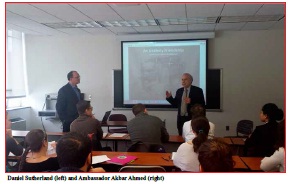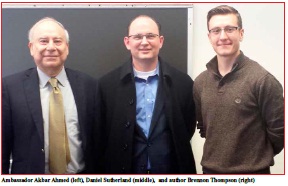A Lesson from our Founders: Cultural Competency, Security and Islam
By Brennon Thompson
American University
Washington, DC

“Class, this is an American you can be proud of!” Our professor, Ambassador Akbar Ahmed ushered our guest speaker to the front of the class. Almost weekly my class, Researching Islam at American University’s School of International Service, has the honor of hosting a distinguished guest lecturer. This week was no different. Daniel Sutherland, currently the Associate General Counsel of the National Protection and Programs Directorate at the US Department of Homeland Security and an experienced human rights lawyer would be offering some valuable insights to our undergraduate class.
Mr Sutherland stood in front of the class, thanked Ambassador Ahmed, and pointed out the window to the Department Homeland Security complex across Massachusetts Avenue. “That used to be a naval facility, some of you might be to young to remember but Homeland Security didn’t exist before 9/11.” When Homeland Security was first established in 2003, they were given two spare floors in one of the naval buildings. Mr Sutherland recalls with nostalgia, “In the early days, we were all crammed together, I shared a typing table with two other guys. You couldn’t really tell who was important and who wasn’t, so you had to be nice to everybody.” President Bush appointed Mr Sutherland as the Officer for Civil Rights and Civil Liberties, a new position being piloted by the agency. His job was to advise the Department on their policies ensuring a balance between security and liberty.
“I’m a White Christian from Northern Maine, they used to call me White Bread,” Mr Sutherland joked. “How could I go from that to having working relationships with people from different backgrounds?” He had never met a Muslim until he met Ambassador Ahmed, and that was typical of most of his colleagues as well. This was true of even the most senior officials, former Secretary Chertoff himself had no experience with Muslims. In an effort to correct this ignorance, Chertoff tasked Sutherland with organizing a meeting with top Muslim intellectuals. A meeting was scheduled for 45 minutes, staffers asked for the agenda and talking points to which Sutherland replied, “No agenda, we’re just going to talk.”
At the meeting with Secretary Chertoff were three prominent Muslim intellects: the Ibn Khaldun Chair of Islamic Studies at American University and the former Pakistani High Commissioner to the UK, Ambassador Akbar Ahmed; the author of No God but God, Reza Azlan and the third an influential business man. Ambassador Ahmed recalls, “Chertoff really engaged with us, he didn’t just nod his head. He challenged us and asked us questions. I thought to myself, this is a man that is thinking.” As the 45 minutes drew to an end Sutherland attempted to wrap up the discussion, but was repeatedly waved off by Chertoff. The meeting lasted over an hour and a half. At the end of the meeting, Ambassador Ahmed gave the Secretary his latest book Journey into Islam. Later that day, Secretary Chertoff was on a plane somewhere over the middle of the Atlantic, when he emailed Mr Sutherland for a clarification of a passage on page 76 of his book. Not only had Chertoff listened to the three men in their discussion, he was actively learning from them.

One of the programs that both Mr Sutherland and Ambassador Ahmed worked on together was a TSA training DVD. After 9/11 customs agents in immigration were running into difficulties with women coming from the Middle East and South Asia. During routine interviews, agents would perceive the women’s behavior as shifty and suspicious. They were completely unaware of cultural norms such as maintaining a modest distance and avoiding direct eye contact. Mr Sutherland moderated an hour-long panel discussion, featuring Ambassador Ahmed and other cultural authorities, which was filmed and distributed to educate thousands of TSA agents. Similarly, Mr Sutherland worked on policies to ensure proper respect for religious attire, such as the Sikh Dastaar (head wrap) and Muslim Hijab, during TSA security screenings.
Daniel Sutherland has cultivated a brilliant cultural competence. As a resource for all of us, he has compiled much of what he has learned of cultural intelligence into a short comprehensive online guide, www.culturalintelligencenetwork.com. An Unlikely Friendship: Lessons in Cultural Intelligence, is broken down into four lessons illustrated through the working relationship formed between President Abraham Lincoln and Fredrick Douglass. Mr Sutherland assured us that these are the most valuable lessons we can take into our fieldwork. Lesson One, Respect: Before Lincoln ever said a word to Douglass, he won him over by inviting him to the White House and making time to meet him personally. Lesson Two, Learn: Douglass had many issues to discuss with Lincoln and the President sat, listened, and learned about every one of Douglass’ concerns. In Sutherland’s own experience, he was the first government official to ever ask the Muslim community about their security concerns. Lesson Three, Take Action: After Douglass outlined his issues to the President, Lincoln went through one by one and addressed them. Many of them he could do nothing about, but where he could take action he did. Lesson Four, Keep Going: Long after this first meeting between the two men, Lincoln worked to maintain his relationship with Douglass. As Lincoln drafted his inaugural address, he wrote Douglass to ask for his input. These four lessons are key cornerstones to any relationship, especially one that must break through barriers of culture and religion.
One important conclusion I drew from this lecture was the significance of Americas Founding Fathers and early leadership. This conclusion might not be clear to many readers without a more intimate knowledge of Ambassador Ahmed and Mr Sutherland. I have noticed a habit of my professor, in every lecture, article, book, and interview Ambassador Ahmed faithfully references the Founding Fathers, Jefferson in particular. I have never met a man more engaged with the principles and philosophies of our founders, quoting and referencing them as if they were old friends. WWJD, an acronym most widely known as “what would Jesus do?” has been adapted for our class to “what would Jefferson do?” This is the motto Ambassador Ahmed lives by. He often asks us questions, most of us American citizens, testing our knowledge of our forefathers. “What was George Washington’s stance on torture?” The class falls silent. “He categorically rejected torture, it was imperative not to compromise the moral high ground.” I’m always impressed with Ambassador Ahmed’s intimate connection to the Founding Fathers, and embarrassed for my classmates and myself in our ignorance. As citizens and students we have taken for granted and forgotten our founding. This is a critical mistake. The bond between these two distinguished men, Ambassador Ahmed and Mr Sutherland, is the true ability to learn from greater teachers that came before them. A lesson we all should learn.
(Brennon Thompson is a sophomore at American University studying International Relations, Development and Public Health)
-----------------------------------------------------------------------------

